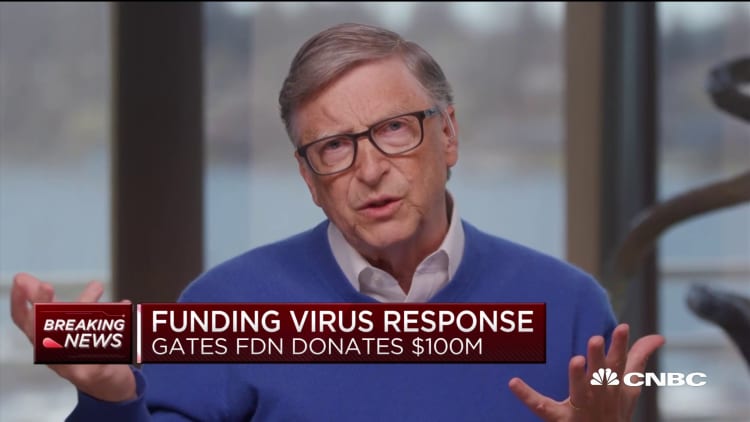Billionaire Bill Gates continues to be one of the most outspoken public figures on the subject of coronavirus, which the Microsoft co-founder has dubbed "the first modern pandemic."
Gates has also made it clear that he sees the pandemic as a "nightmare" and an era-defining event whose effects will linger for years. "It's going to be awhile before things go back to normal," Gates said in a new interview on Friday with NBC's Savannah Guthrie on the "TODAY" show.
"I wish I could say that we're halfway through. But I don't think so," Gates added.
That's because the billionaire believes the United States is still several months, if not years, away from large-scale production of a coronavirus vaccine. Still, he is hopeful that a vaccine will arrive sooner, rather than later.
"Usually a vaccine takes over five years because you have many steps," Gates said in the interview on Friday, noting that vaccine development starts with animal testing before moving on to human testing at larger and larger scales.
However, Gates added that he's seen evidence to suggest that a coronavirus vaccine could be available within the government's stated likely timeline of 18 to 24 months. "The best scientists [are] working hard on this," Gates told Guthrie. "In fact, in the last few weeks I've seen signs that we may get to the optimistic side of that time projection" for a vaccine.

That estimate echoed what Gates wrote in a post on his personal GatesNotes blog on Thursday. Gates wrote in the post that vaccine timelines could range anywhere from just nine months to two years, but he believes an 18-month wait is more likely, which would mean a vaccine could be widely available sometime in the middle of 2021.
So far, the Bill & Melinda Gates Foundation has committed $250 million in funding to help the world develop an effective coronavirus vaccine, which he wrote in his blog post is "the only way to return the world to where it was before COVID-19 showed up."
Gates (who has also become a top target of coronavirus-related conspiracy theories) also remains critical of the U.S. government's response to the coronavirus pandemic. In March, Gates said the U.S. "did not act fast enough to have an ability to avoid the [coronavirus] shutdown," and he called President Trump's decision to defund the World Health Organization (WHO) is "as dangerous as it sounds."
In the interview with "Today", Gates called out the U.S. government for not ramping up testing for COVID-19 as effectively as other countries.
"Many countries decided that at the national level, they would orchestrate the testing" for COVID-19, he said. "That hasn't happened in the United States. It might not happen. But, you know, the access to tests is just, you know, chaotic."
Gates laid out what he believes the U.S. government needs to do to step up testing measures in his blog post on Thursday. These steps include developing COVID-19 tests that can return results in less than a day, as well as providing tests to all health care workers and finding a way for people to take tests in their own homes.
"Testing becomes extremely important as a country considers opening up," Gates wrote, noting that most developed countries will be able to start considering reopening daily life — returning to a "semi-normal" way of life that still includes social-distancing practices — within the next two months.
Check out: The best credit cards of 2020 could earn you over $1,000 in 5 years
Don't miss:
Bill Gates is the top target for coronavirus conspiracy theories
Bill Gates: This is how long it may take before Americans 'can be completely safe' from COVID-19
Like this story? Subscribe to CNBC Make It on YouTube!


